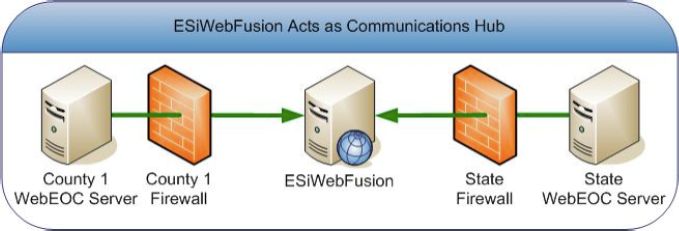WebEOC Fusion
Regional clusters of Unified Command Platform installations have created the need for customers with separate instances of Unified Command Platform to be able to communicate collaboratively and share data. Unified Command Platform has met this need to date through remote board and dual-commit functions. However, both functions have intrinsic limitations.
For example, Web-enabled systems, such as Unified Command Platform, are protected by firewalls which help prevent unauthorized access to the system. While firewalls are vital to security, they do complicate communication between systems unless firewall restrictions are relaxed, thus reducing the security of both systems.
Now, however, WebEOC Fusion, formerly known as ESiWebFUSION, allows a Unified Command Platform server to communicate with other Unified Command Platform servers, or extensibly to third-party systems, by acting as the central communications hub to route messages to intended recipients. If the recipient Unified Command Platform system is not available, WebEOC Fusion stores the message until the system is available.
Because systems using WebEOC Fusion make outbound-only connections, firewalls can remain in place, maintaining maximum security.
In addition to increased security, WebEOC Fusion offers several advantages over remote board and dual-commit methods of sharing information among multiple Unified Command Platform systems.
-
WebEOC Fusion is “always on.” The dual-commit feature requires the remote Unified Command Platform system to be available at the time data is entered.
-
All information sent to WebEOC Fusion is temporarily stored until it can be successfully delivered. Any temporary loss of connectivity prevents communication with the remote system, causing non-delivery of the data to the recipient. However, if transmission is interrupted due to a network outage, the data is queued on WebEOC Fusion and then automatically transmitted once connectivity is restored.
-
Unified Command Platform Local data is always available. Data entered into Unified Command Platform is always stored on the local server before transmission over WebEOC Fusion. If a loss of network connectivity temporarily prevents communication with WebEOC Fusion, data entered locally is still immediately accessible.
-
Subscription Boards make a status board instantly available to other Unified Command Platform systems on the network. The remote boards feature in Unified Command Platform allows users to view and post data to boards hosted on external Unified Command Platform systems. Because data posted to remote boards is stored on the host system only, client systems lose access to the data when network connectivity is lost.
-
Unified Command Platform systems subscribing to the board can see data posted by each participating Unified Command Platform system. Data is duplicated locally at each Unified Command Platform system ensuring access to existing data in the event the network connectivity is lost. Changes to the board design by the creator are automatically propagated to each subscribing system.
-
WebEOC Fusion is extensible. Through the use of plug-in modules, WebEOC Fusion has the ability to support communication with nearly any type of external system. External systems communicating with Unified Command Platform over WebEOC Fusion enjoy the same message delivery and data encryption features.
Compatibility
This add-on has been developed in English (US) and has not been internationalized. For more information, contact your Client Success Manager (CSM).
Flow
